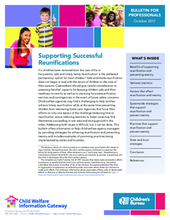Displaying 281 - 290 of 437
This study examined factors associated with extracurricular participation and whether participation in extracurricular activities is associated with completing high school and attending college among a sample of older youth transitioning from foster care.
This webinar series provides clinicians, counselors, and other helpers with insights on recognizing and dealing with the most difficult crises and turning points that occur in therapy with traumatized children and families.
This chapter provides a description of the Partners in Child Protection (PICP) project, the assessment protocols utilized, and the implementation strategies applied to support and maintain the partnership.
This study employed Concept Mapping (CM) with a convenience sample of 51 foster youth/alumni in one southeastern state in the US to explicate a conceptual framework for the development of campus supports for collegiate foster youth/alumni, and examine priority areas (e.g., importance and feasibility).
This podcast gives listeners an overview of how Arizona Kinship Support Services implements the Family Group Conference (FGC) model.
This bulletin offers information to help US child welfare agency managers by providing strategies for achieving reunification and preventing reentry and includes examples of promising practices being implemented by States and localities.
The objective of this presentation is to highlight, through the presentation of a clinical case example, how a community-based social services agency, such as Northern Virginia Family Service (NVFS), responds to the psychosocial needs of unaccompanied minors and their families and addresses and mediates barriers to successful family reunification.
This talk will explore the adaptation of FOCUS, an evidence-based, skill-building preventive intervention, for foster families and foster youth in college and provide clinical adaptations.
The goal of this presentation is to describe a unique manualized Adoption-Specific Intervention (ADAPT) intervention, developed specifically for families adopting older foster care youth. Important lessons for mental health clinicians working with families of adopted youth will be discussed.
This presentation will discuss methods of assisting reconnection and reunification in families of unaccompanied minors immigrating to the US.

